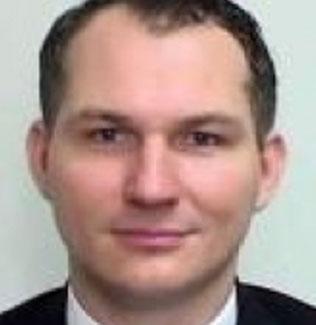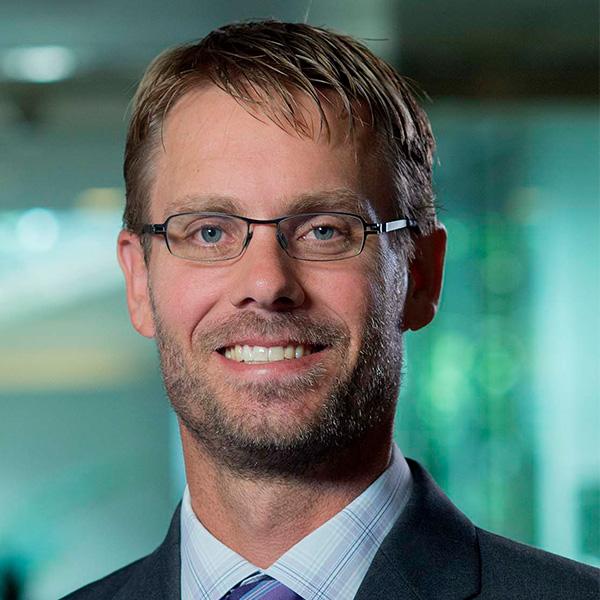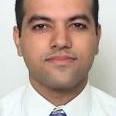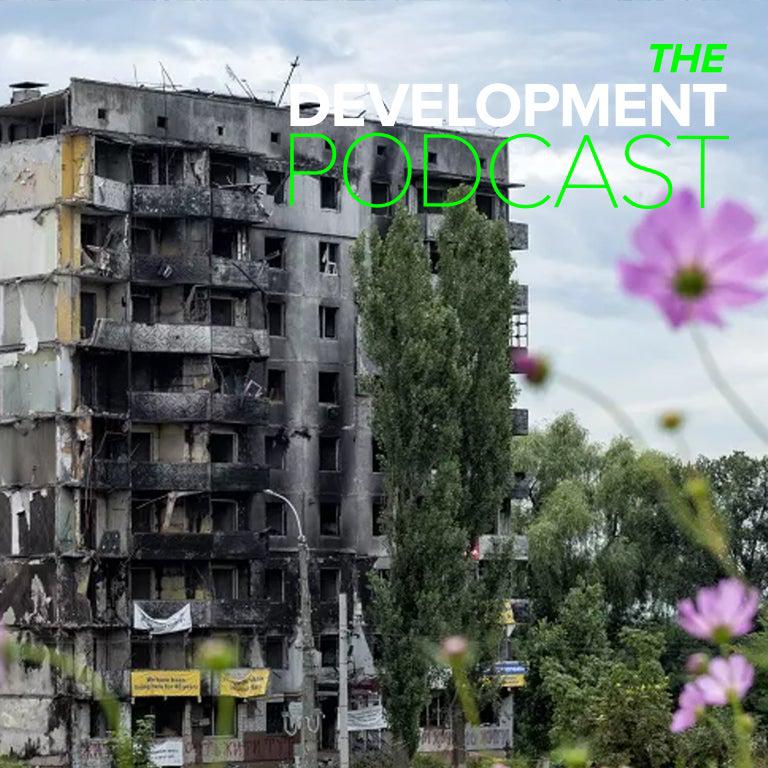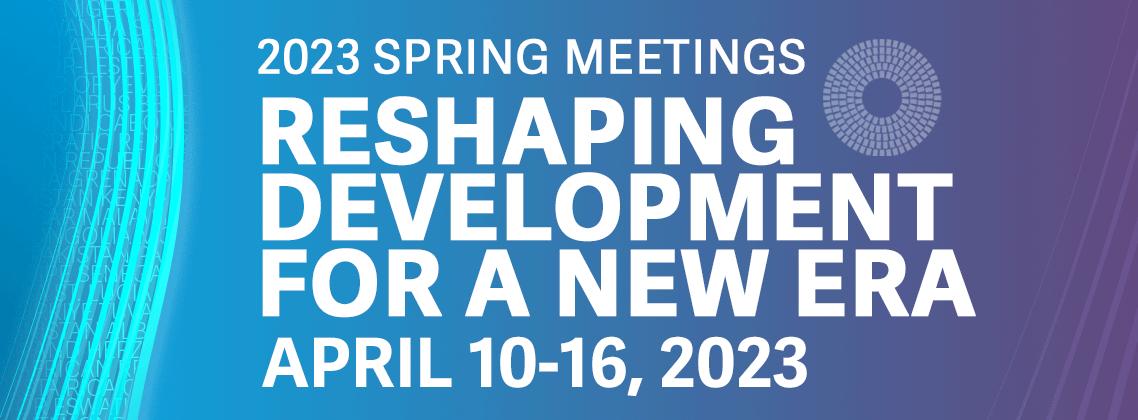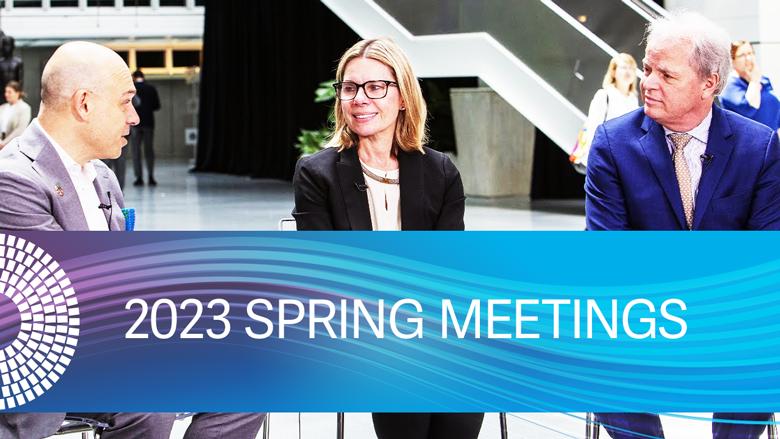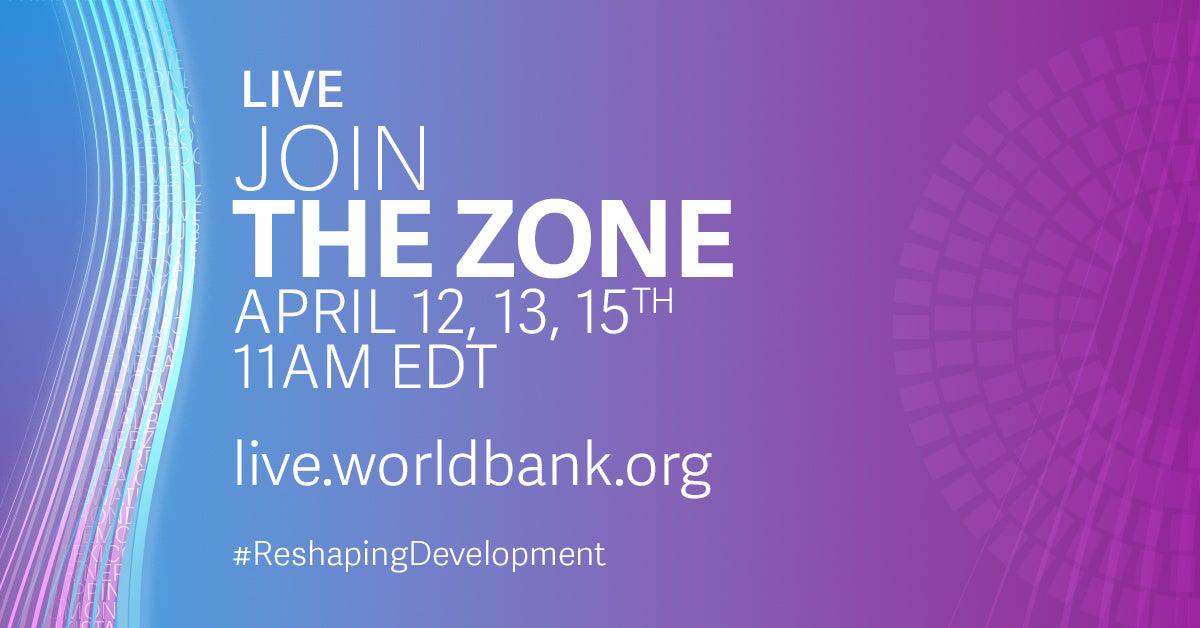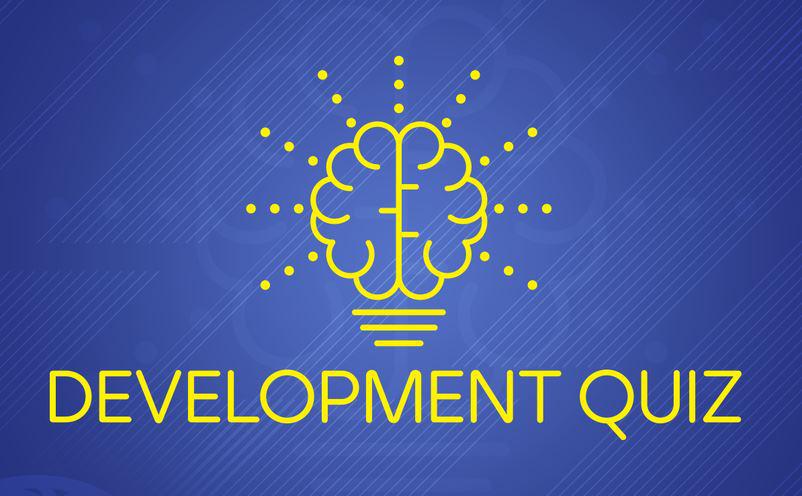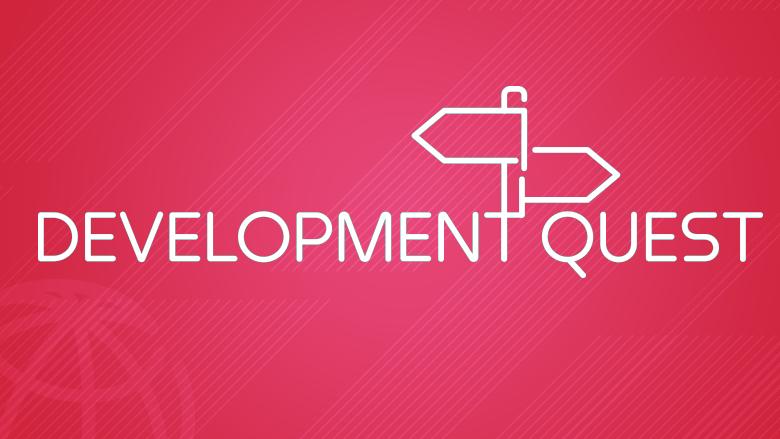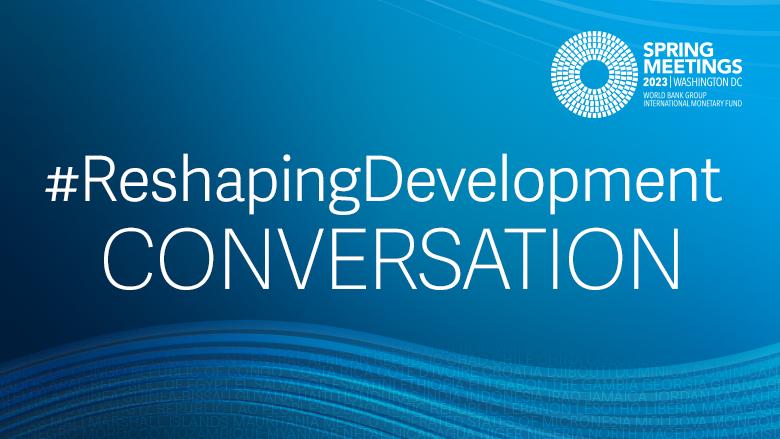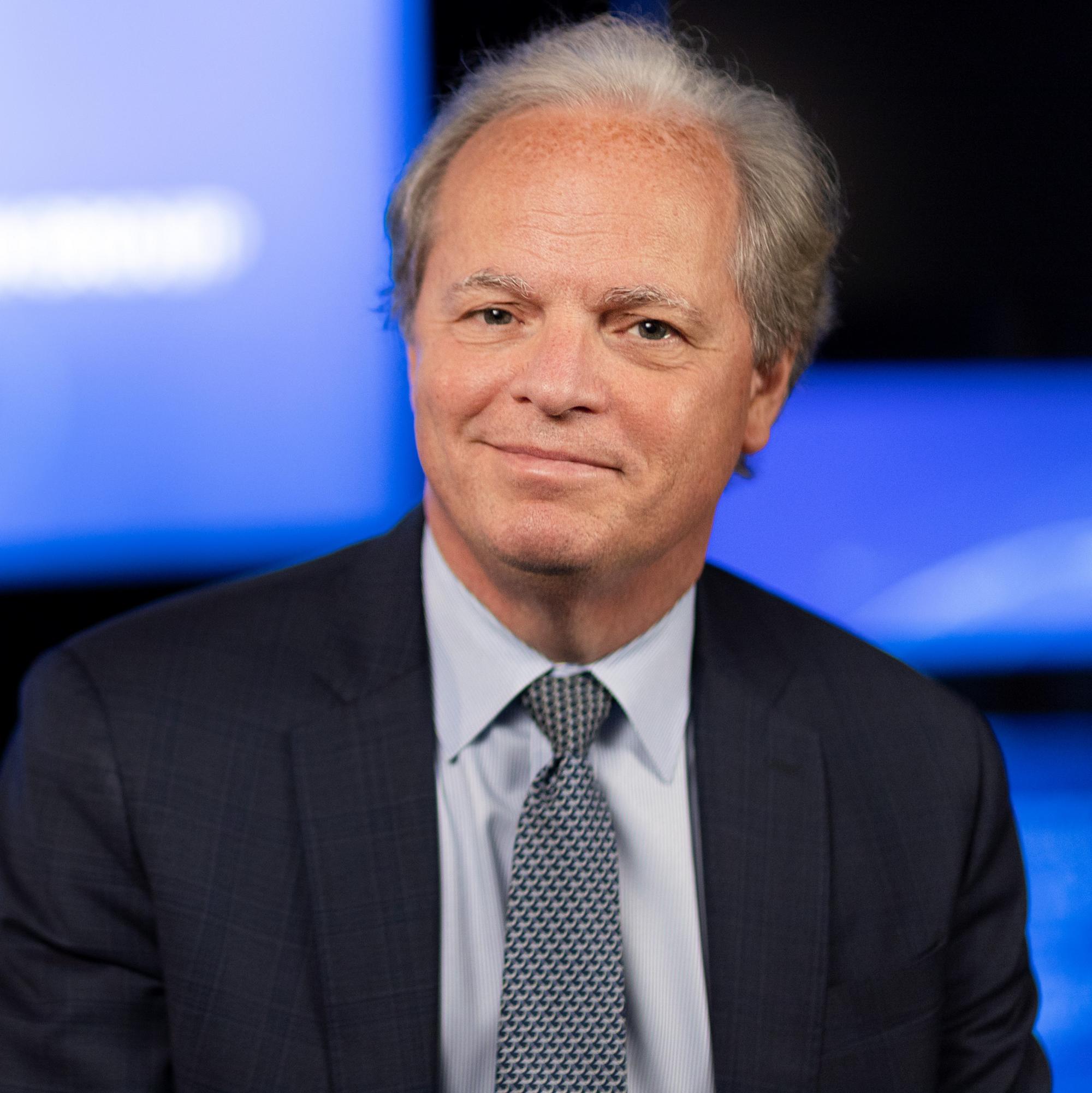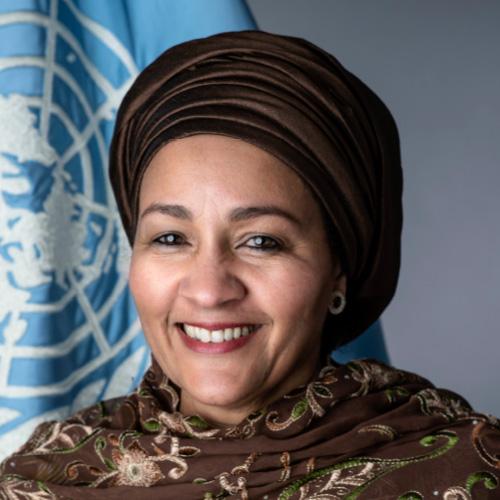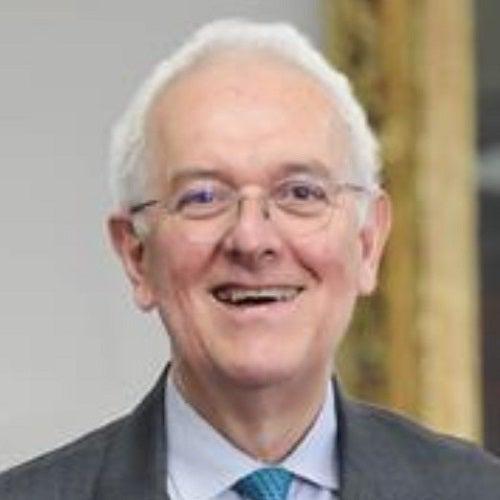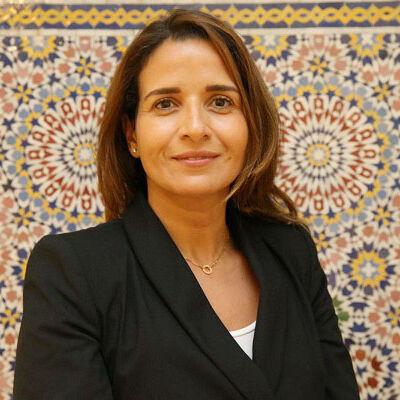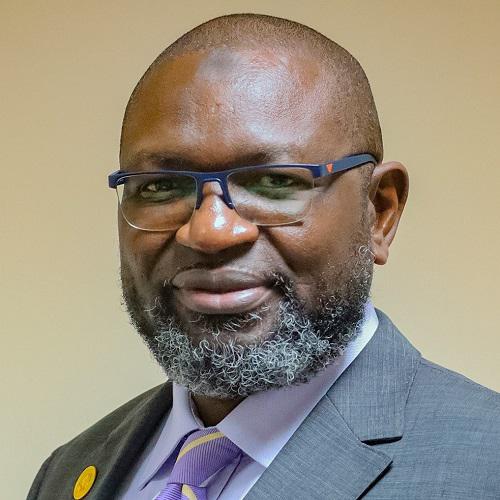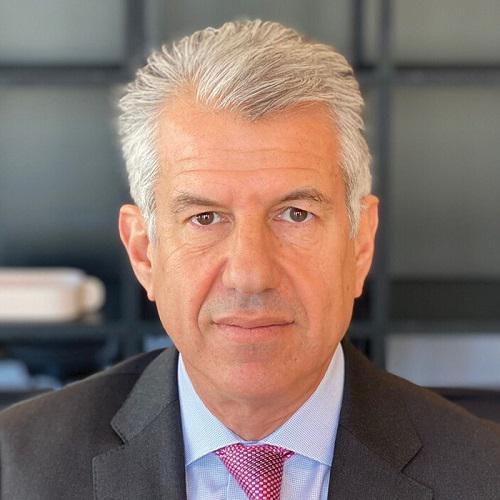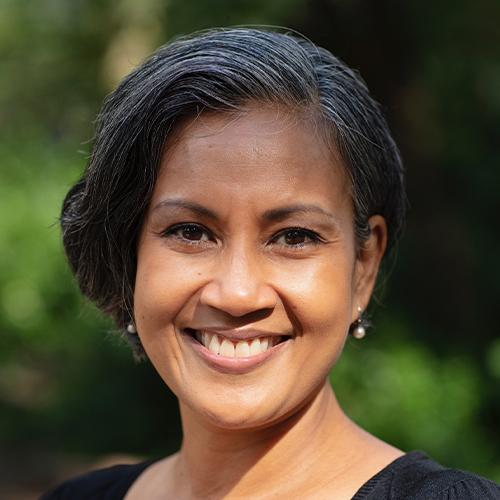[Music]
[Shakuntala Santhiran]
Hello and welcome to the 2023 Spring Meetings of the World Bank Group and IMF. I am Shakuntala Santhiran, Shaks for short, and I will be your moderator for this event, Accelerating Development in an Age of Global Crisis. Over the next hour, we will focus on the enormous development crises confronting the world today, from climate impacts and the COVID-19 pandemic to persistent conflict and deepening poverty. We will discuss how the international community can step up its efforts and work together to overcome these challenges and forge a path towards a more resilient, inclusive and sustainable future.
Remember, you can share your thoughts on these topics at any time using the hashtag #ReshapingDevelopment. Please use the QR code you see on the screens to post your questions or if you are following us online, join the chat at live.worldbank.org.
Please join me now in welcoming Axel van Trotsenburg, who is the Senior Managing Director of Development Policy and Partnerships at the World Bank Group. His Excellency, Jose Antonio Ocampo, Minister of Finance and Public Credit of Colombia, Her Excellency, Leila Benali, who is Minister of Energy Transition and Sustainable Development of Morocco, Dr. Ahmed Ogwell Ouma, who is Acting Director of Africa Centres for Disease Control and Prevention (CDC), and Dan [Daniel] Zelikow, who is the Chair of the Governing Board of J.P. Morgan’s Development Finance Institution.
A very good afternoon to you all. Thank you very much for joining us here at the MC Atrium at the World Bank. And we have Amina J. Mohammed, Deputy Secretary-General of the United Nations and chair of the UN Sustainable Development Group, who will be joining us later in the program.
We have a global crisis with multiple dimensions, overlapping, interconnected challenges. We need change to accelerate development. Axel, what is the World Bank doing to help developing countries? How does that help evolving? How must it evolve amid these many challenges?
[Axel van Trotsenburg]
We have learned a lot over the last three years. First and foremost, you have to deal with the crisis but as a development organization, you should never take your eye off the long-term challenges.
You need to meet a double task crisis management but also long-term development, and during times of crisis, what you need, as operationally, you need to react fast and with volumes. That is what we actually did. We scaled up our operations over the last three years to about 210 billion dollars up from under 30 billion dollars to three years prior to this. What was important is to do that crisis management and at the same time, the longer-term development. What is also important is you can no longer do this alone because these are global challenges. COVID-19 is global, climate is global. So, what you need to do is you need to work in concert to do this. That has actually been good news that we have had as an organization to be able to respond to these challenges. But there are enormous outstanding challenges. SDGs are hopelessly off track. Climate change is off track. We have increased fragility, so we need more resources, and we need to see how we can, in a time of fiscal stress by countries, mobilize the necessary resources, but also tap increasingly into private sector resources so they can accompany our efforts, be it in middle-income countries, be it in the low-income countries.
[Shakuntala Santhiran]
We are going to be hearing from the private sector a little later on with Dan. Axel, you've been meeting a lot of countries’ clients here at the Spring Meetings. What are they asking for? What do they need?
[Axel van Trotsenburg]
I think most need more and I think there's a difference here, particularly with the low-income countries. They have been badly hit and, unfortunately, they will need more. They are greatly concerned about the debt situation that is coming up, but they have also been battling the food crisis, so they need that multiple support. We are trying to provide additional resources to IDA, and we are trying to set up a crisis facility that could provide additional supplementary support and we are going to engage the donors next week on this. For the middle-income countries, they also have their challenges, but also the expectations are high in terms of climate financing. There has to be more on the table and therefore I think the reform process that's going on in the Bank is not only taking into account these global challenges, but we should stay focused also on poverty. We need to do this altogether, but we need additional resources and that is the name of the game.
[Shakuntala Santhiran]
Thank you. Axel. Let's welcome now Amina J. Mohammed to the stage. Hello there. Thank you for joining us. Ms. Mohammed is Deputy Secretary-General of the United Nations.
Let's jump right in if we can, Ms. Mohammed, we are hearing that change is needed. Is change afoot as well with how the UN is approaching the Sustainable Development Goals? We heard Axel just now saying that it's off track. We've heard the UN Secretary General saying that the world is far off track to achieving the SDGs by 2030. So, how is the UN getting back on track?
[Amina J. Mohammed]
Thank you. There we go. Women always hit the ground running. Thank you.
Look, we are off track. We were off track before COVID-19 it, exacerbated it, and then we had, of course, the war in Ukraine, and that's done even worse. However, what we are doing at the UN is to mobilize at the global level on the issues that we can bring to the table, whether it is finance, it is the transitions on energy, on food, and to agree how we will go about landing those at the country level. That's a partnership discussion. It's a partnership discussion with the international community, it's one with the private sector, but it is one, most importantly, with national governments making sure that their priorities are the ones that we are supporting and that we are engaging key constituencies of youth and of women. Now, the SDGs, we will have a summit this year. It's a stock take. It is in the midst of crisis, and we've heard all through these last few days how bad that is. The means of implementation are not yet there, and that's the discussions that we have today, how can the institutions with what they have become more effective, but how can we also really think through to the future, which is now.
Our institutions that were built many years ago are no longer fit for purpose and we have to recognize that. We have to recognize that both the ownership, the structures and the responses need to be different. Again, discussions that are happening here today. Many of the issues we've picked up have been that of the debt crisis, which is very real for over 52 countries today. We need to find ways of addressing that with restructuring debt, but we also need access, and we need liquidity, and we need long-term accessible funding. This we know is available, but we need the political will to open up those doors for many developing countries so that we can meet the promises of the Sustainable Development Goals.
The partnerships start with us in the international community, within the UN, within the IFIs, we are here in DC at the World Bank because those partnerships matter on the ground. We have done a considerable amount of work together in very difficult crises and humanitarian settings. But it needs to go further. It needs to be scaled up, so we welcome that. The shareholders have again given us another tool, the evolution roadmap for the Bank that hopefully will get the ambition to help us do the job on the ground.
[Shakuntala Santhiran]
So, we are talking about the need for partnership, the need to mobilize resources across sectors. How closely is the UN working with the World Bank and with the private sector?
[Amina J. Mohammed]
Well, with the World Bank, day and day, we have work that we do on the ground together. In most recent crisis settings in Yemen, in the response that we got phenomenal resources from different partners. In Pakistan, these are two major climate responses. But with the country teams, when we are speaking about the energy transitions, so the digital transformations on the ground, the food systems, more recently, the Transforming Education Summit, this is again another area that we are working with the World Bank on the ground.
With the private sector, it is a little more difficult. The private sector was a key stakeholder in shaping the Sustainable Development Goals. Many private sector companies have looked at their business models and with the UN global compact have come to the table. What we need to see is the scale of that participation and more engagement with business in the North and business in the South. This is a huge opportunity. We are hoping that some of the work that we are doing with the Bank that will look to leveraging more resources from the private sector will do just that, and how that happens needs to have the private sector in the room.
So, if I would say there is a challenge, not yet in the room, they are missing in action, and while they may be doing very well on the outside, what they need to be doing within development and together with the international community is still a challenge I think that we have to address.
[Shakuntala Santhiran]
We are going to hear Dan's perspective on that very shortly, a little later in our conversation. First, thank you very much, both, for giving us that global perspective from your international organizations.
Let's dive into some specific country experiences now and solutions. Conflict and violence, political and economic instability continue to force people to flee their homes. Colombia is taking a very different approach from much of the world to how it is managing its migrant flows from neighboring countries. Instead of being anti-immigration, you are taking an inclusive approach, including ensuring that refugees, that migrants have access to basic services and livelihoods. Minister Ocampo, how is Colombia managing this? What kind of policies have you implemented?
[José Antonio Ocampo]
Thank you very much for that. It’s very nice to be in this panel. Let me say that actually Colombia should be seen as one of the world examples of how to manage an unexpected flow of migrants. We had a massive migration of Venezuelans due to the crisis in Venezuela.
Colombia basically adopted a mechanism that goes from temporary absorption of the migrants to more permanent mechanism to allow them to settle in the country. One of the good things about the policy, I must say, was the fact that the country looked at all the needs of migrants, of course, easier from the point of view the government to absorb, for example, access to education for children, access to health for all the family members, and, of course, working to allow them to settle in housing, less so, but trying to also get them employment, which, of course, I must say, Colombia has absorbed a lot of employment from Venezuelans in a positive way. That actually, by the way, you can say it is part of a broader process that not only involves migrants, but also one area which is critical for Colombia, which is the faraway communities within the country as part of the peace processes in which we are involved. Trying also to promote the development of faraway municipalities, for example, again with an integrated approach, in a sense, taking into account all the SDGs of the United Nations. Trying to see, for example, access to education, to health, to housing, to water and sanitation, to electricity, to information technology for faraway regions, which is generally to all forms of infrastructure, including, of course, the information technology.
[Shakuntala Santhiran]
What kind of help or support did you get from the international community to make this happen?
[José Antonio Ocampo]
We did get significant support, including, by the way, from the World Bank in that regard. But let's say for many of these processes, we have had significant international cooperation. But let me say, in any case, the country had to dedicate resources of its own to many of these issues. Let's say, for example, for the education and health systems, basically were Colombian resources that were put into this process.
[Shakuntala Santhiran]
With political will and collaboration with development partners, progress in the refugee crisis is possible.
Let's take a look now at energy, which is a very big piece in the climate change puzzle. Minister Benali, Morocco has implemented some strategies to reduce its dependence on external sources of energy. How is your country using green renewable energy to create growth and jobs and also to promote regional stability?
[Leila Benali]
Thank you first for the invitation to this panel. I think this is a great question because it really encompasses and summarizes Morocco's energy strategy since 2009. That strategy has been stable over time. I would say the first key factor in any energy strategy is stability. We have three key pillars. You mentioned renewables. So, of course, we have that target of exceeding 42% of our installed capacity based on the renewables. We reached it. We have a new target of 52% of our installed capacity based on the renewables before 2030, and mind you, that's because Morocco has been one of the very first countries to revise its NDCs to be aligned with Paris. We are very much taking that into account in our energy strategy. The second key pillar is efficiency. Efficiency on the demand side, but also on the supply side, and how you produce, how you transport and how you consume energy. The third key pillar is actually regional integration. There, we were put into tests four months before the Russia-Ukraine war, in the sense that we had a ten BCM transcontinental pipeline from Algeria to Europe crossing Morocco, in which 10% of our installed capacity was relying on, and this pipeline went idle, totally empty. So, we had to do what Ukraine did, actually. We reversed that pipeline to get access to the international gas market.
The reason why I'm mentioning this is because it boils down to your question about energy security. Having an integrated regional market and having access to international energy markets in an inclusive manner is quite key in our energy strategy. I think we demonstrated it. Luckily, we had to do it before the war, so we were ready when there was the war. Despite, I would say, the volatility and commodity prices, we were able to, before the summer of 2022, have access to the international LNG market. But that's just one example of what I was saying, market integration can give you regional stability and where energy security can give you regional stability. We were able, actually, to work with our European counterparts at the time when even diplomatic relationships were a bit strained, to work on a very kind of unique setup to get access to the international energy market. Now, to get that triangle stable over time, I think there are two things that are now a bit of concern is the fact that these series of multifaceted crisis that the world is living in in the 21st century, including climate but not only that, is pushing for more fragmentation and protectionism in markets. That's one thing that we are trying, as the Kingdom of Morocco, to convince our international partners that market Integration is really key in keeping that mutual dependence and energy security for everyone to have a just transition and future. A second, I would say, small concern that we are having because Morocco having 20 years of experience in pushing for renewable projects, now, we are having a second wave of renewable projects, is the ability for the international financial community, including the merchant banks and international financial institutions, to take into account climate risk in financing renewable projects. So, today, we are having developers concerned about financing solar plants or wind farms or hydro projects, because they are not sure of the performance of those plants in ten years, 20 years’ time, because of the change in seasonal patterns, change in wind patterns, etcetera. So these are two key areas that we are watching very carefully in our strategy.
[Shakuntala Santhiran]
Thank you, Minister Benali, for showing us that energy security is important for regional stability.
We are now going to hear about an example of how regional cooperation is so vital from Dr. Ouma. The Africa CDC has been key in enhancing how the region can respond to and its pandemic preparedness. It actually responded to the COVID-19 pandemic better than originally predicted. How did Africa as a continent do that?
[Dr. Ahmed Ogwell Ouma]
Thank you and thank you for inviting the Africa CDC to participate in this.
Now, you are right that the Africa CDC performed much better than I could have predicted. I would like to say that the Africa CDC was the best performing intergovernmental organization during the COVID-19 pandemic. I say that because under the constraints that the continent had, the kind of results that we produced were unprecedented in many ways.
During a crisis, there are three things that are very important. One is decisions must be made. Whether they are easy decisions, they are difficult decisions, they are right decisions or wrong decisions, they must be made. The second thing is they must be made quickly because you are in an emergency. And third, those decisions must have resources attached to them so that they can be implemented. We did all three in the following ways. At the beginning of the pandemic, in, well, at least our first case on the continent was in the middle of February of 2020. The chairperson of the African Union at that time was President Ramaphosa of South Africa, and he took the unprecedented direction of convening his peers every two weeks. The heads of states of the continent met in excess of 14 times in 2020 alone. They were not meeting just to talk. Each session, a decision was made and from those decisions, the result is the success of the Africa CDC that you see. So, they took decisions regularly and they made them family, giving us the confidence to go out and do what we have been instructed to do. They also attached resources to those decisions. First, it was local resources from within African governments, and then the private sector stepped in. Then friends of Africa, when they paused from their own crisis, also stepped in. The World Bank has been a very good friend, and we are coming back to strengthen our friendship in the coming days and weeks. Before the pandemic –I'm not saying that because I'm in the Bank–, the Bank was already supporting Africa CDC in strengthening networking of public health assets in parts of Africa. The pandemic disrupted that, but we had already formed a very good relationship, and in the middle of the pandemic, the World Bank invested again in the Africa CDC for institutional strengthening. I am allowed to say it is 100 million over, I think, three or four years, and we are happy that they picked institutional strengthening.
So, when we look at the way regional efforts come into play, we must appreciate that there are regional institutions that are in place that need to be strengthened so that they can do their rightful mandate of ensuring the region is safe. When the region is safe, the globe is also safe. We have done that with very good results, and we are absolutely convinced that if we strengthen the Africa CDC further, we will delay the next big outbreak. God forbid another pandemic comes, we will respond to it better, with even better results, not just for the continent, but with lessons being learned for the rest of the world.
[Shakuntala Santhiran]
So, Dr. Ouma, Ahmed, you've been talking about the need for resources. All the solutions we've been hearing about need resources, need funding, and public funding alone is unfortunately not enough. We need the resources and engagement of the private sector. Dan, the J.P. Morgan Development Finance Institution was established in 2020 to mobilize finance to support the SDGs in emerging economies. How successful have you been in mobilizing private sector finance?
[Daniel Zelikow]
I'll get to that, but let me just kind of mention that the spirit in which the J.P. Morgan DFI was initiated is that there is a growing cadre of investors out there that are pursuing what's called a double bottom line. Essentially, they want not only financial returns, but they also want social, economic, or environmental returns as well with their investments.
The key for us was organizing some subset of our existing products and services with a robust framework that involved reporting, intentionality and standardization. This was a similar mechanism to what had happened with the evolution of the green bond market, as well, but we wanted to short circuit that, make it go faster, and also make it clear that, in the case of the green bond market, in some ways, for reasons we do not need to get into here right now, it actually discriminates a bit against issuers in the emerging markets and developing countries. In our view, you cannot do development without being focused on climate, and you cannot do climate without being focused on development. So, we felt that it was appropriate to merge the two in our framework. To do that, we formed an MOU with the IFC, the private sector lending arm of the World Bank, and we adapted what the IFC had been using, called the AIMM framework, which is an impact measurement framework towards our much broader array of services. Broader because we have a securities license, the IFC does not. But in other respects, our methodology was very similar. For example, it includes certain exclusions on which we will not work. It involves the identification of a development gap for a country. It involves an assessment of the intentions of a development actor, be it the sovereign or be it a corporate. Most of our deals so far have been with corporates. It also involves an assessment of the intensity with which that corporate or sovereign is actually focused on the development challenges that it has identified ex ante and then of course, a robust reporting framework.
So, our strategy basically had three parts. First, with respect to investors, we felt, as I just said, that if investors know what they are buying, they know what the development impacts that are expected, that are going to be reported on, that they are more likely to buy an asset if they are pursuing that double bottom line than one that doesn't have that reporting framework around it. Second, issuers, and this was somewhat to our surprise, it turns out that our issuer clients were much more focused on doing a development finance instrument, be it a bond, a loan, a swap, an M&A transaction, an equity deal than we had anticipated because they want to tell their own development story. In effect, they are keen to submit themselves to a kind of accountability and finance. Why are they using third party money to do this? Then fourth is that we thought that this would make us more successful in working with, not in competition, absolutely with the established multilaterals in the official sector as well as national development finance institutions.
What are the results so far? We’ve launched this in January 2020. As of the end of 2022, we had qualified 380 billion dollars across some 1750 transactions banking, investment banking and markets, all of which involved essentially raising of new capital and that's of the totality of J.P. Morgan's transactions that were qualified and eligible, affecting conditions in the developing world. Perhaps more importantly, our Development Finance Institution team has worked very closely on 42 transactions since January 2020 in working with issuer clients, in helping them tell their development stories, helping them extract why you are trying to how do you see this as being in any way developmental and then submitting to concrete targets about what they are trying to achieve and agreeing to report on those with a regular cadence. Each of them is tied to the SDGs. We prefer in our methodology to relate everything to one or more of the UN SDGs. Others may prefer other frameworks, but we think it works best with the UN SDGs. I think another very important aspect of this is that we have also identified some 75 investors, ranging from the largest institutional investors in the world that are setting up ESG oriented funds focused on the developing world or specialized ESG or impact funds.
Just a couple of final observations about our approach. The first is that it is an issuer-oriented approach. It is not a use of proceeds oriented approach, as is the case, say, for green bonds. Second, it is purely commercial. We are very explicitly doing this with a profit motive in mind because we believe that that will help scale it up faster and devote more resources to it, both human and capital. Third, our approach is completely open source. You can see our methodology, our results, everything on our website. Then finally, we are trying to socialize this methodology across the ecosystem working on this activity, whether it's peer institutions that is sell side intermediaries like ourselves, asset managers, third party rating institutions, and multilaterals and bilateral DFIs. We had our first meeting this morning of 27 different entities to try and socialize this, which we hope to be doing over the next several months.
[Shakuntala Santhiran]
Thank you, Dan. It can be a win-win situation.
[Daniel Zelikow]
We think so.
[Shakuntala Santhiran]
You can meet the bottom line and have financial returns as well as development outcomes, positive outcomes.
We have time now for some questions from our audience. We've selected a few beforehand. The first one is for Ms. Mohammed. So, Ms. Mohammed, Bob Malone asks if the climate crisis, which in his opinion is by far the worst of the crises engulfing the world, cannot be addressed without the support and commitment of the rich countries. Is this happening?
[Amina J. Mohammed]
Yes, it's happening to a degree. I think we've seen progress in the last COPs in Glasgow and Sharm el Sheikh, and we will go to COP28, we hope, with much more. I think there are many indicators to whether the Paris Agreement has been met or not. One of those, I would say the handshake for it, again on the finance side has always been the 100 billion. It has not been met. As we said, 100 billion is not going to deliver climate action to solve the challenge of our 1.5°C world. But it is an indicator as to whether the world is going to step up to the commitments that need to be made on many transitions. I think that we are looking for much more at the stock take at COP28. We are already beginning to see that there is a mobilization to do better in our multilateral development banks, to try to leverage the private sector and to see many more partnerships to get it done but we are still a way off.
[Shakuntala Santhiran]
We need words turning into action. More concrete action on the ground. This dovetails into a question from an anonymous viewer for you, Axel. Climate change has its causes around the world and especially in more developed countries that pollute more. What can the World Bank Group do to address such a truly global issue, knowing that it traditionally works with developing country clients?
[Axel van Trotsenburg]
We can do very different things. First, advocacy is a huge problem, and we need to encourage action that is partly also in line with the SDGs. It is the awareness building and then ultimately the action. So, that is one. Secondly, we need to provide analytical work. We have been working with countries on so called country climate and development reports to see how you can get to net zero and what are the options available. Then, you can bring financing to the table and clearly every organization should do its maximum. We have actually been doubling our commitments to 29 billion over the last four years, but this is only one organization. I think what we need to look at is we need collectively we need, literally, trillions of dollars and that is the challenge. That is where we need to point out what we need to do, and we need to have a long-term commitment to this. I think we can act in various ways. Finally, we need to have a coalition, the coalition who is aware that can be from the UN system, can be from bilateral institutions, can be in the private sector. We need a voice that is loud and clear, that waiting is not an option and waiting has a cost. The cost of inaction is much higher than if we were to act and we are off track.
I think this is where urgency needs to be transmitted but ultimately what we are also saying here at the World Bank has to be translated not into words, it has to be in action and here in this case in financing and much higher financing.
[Shakuntala Santhiran]
So, on that subject, back to you Dan, briefly, maybe, this time if we could. There's been much talk about the importance of catalyzing through the World Bank and other multilateral institutions, catalyzing, scaling up private sector engagement finance to support development goals. How can, how should they be doing that?
[Daniel Zelikow]
I think that they are doing it like in our own case that I just gave you. With the establishment of the Development Finance Institution at J.P. Morgan, it was their intellectual property grafted onto our institution that enabled us to launch this and to mobilize 380 billion dollars from the private sector. That is not because we were so smart, it's because we are big. So, we take their smarts, apply it to our “big” and we will be good. But I do not think that kind of an obsession about financial engineering is going to get us there. I do think that first of all, I would say the world's governments really do need to scale up the official institutions much larger than they currently are. We are very much in favor of much larger World Bank essentially, much larger regional development banks, much larger bilateral development banks. Just because we think that the private sector can play a multibillion, perhaps trillion-dollar game does not mean that they are not vitally important.
The other thing is that they are by far the largest agglomeration of development experts in the world under this roof. So, how can we take that intellectual capital, disseminate it in ways that will attract private investment? I believe that their intellectual capital is as much, if not more important than their financial capital. So, I think the challenge is for them to do things like more project preparation for the private sector to finance its standard setting like they are participating with our Development Finance Institution and kind of making that an industry standard. This is the kind of the sorts of ideas that I think makes sense.
[Shakuntala Santhiran]
Thank you, Dan. Let's squeeze this in. We have an audience question from Charles Mills and it is for Axel again. Food insecurity has been exacerbated by the war in Ukraine, among many other factors. How is the World Bank or how can the World Bank help alleviate food insecurity?
[Axel van Trotsenburg]
We are now focusing on food security. Food has been a problem for a long time. I just recall that in 1974 there was a decision to phase out hunger in ten years. I think collectively the world community has failed over the last almost 50 years to do so. The problem has gotten worse after the war, but it was already in a very bad situation. What we are doing is, at the Bank, we try to respond from two angles. One is the short term. That is a lot on social protection, but you need then to look at resilience, resilient agriculture that requires long-term investment. We have said we would provide about up to 30 billion dollars over a 15-month period. We had a new financial of 12 billion. The demand was such that we had committed that six months early. It is clear that there is an urgency to act, but we need to handle the short term and particularly the long term in the agriculture system.
What I have also said at the board is apart from what the countries need to do on reorganizing their agriculture system, it's also necessary that industrialized countries cut their subsidies. But subsidies, agricultural subsidies are also introducing enormous distortion in their local agricultural systems and partly are destroying their livelihoods and that is a huge problem as well.
[Shakuntala Santhiran]
The Global Economic Commission on the Economics of Water was just talking about the need to remove or transfer these subsidies to something more effective.
[Axel van Trotsenburg]
That would be even better.
[Shakuntala Santhiran]
Thank you very much to our audience for your great questions. We have time for a quick fire around for all our panelists in one to two minutes. What is the single most important action that needs to happen or be scaled up to deliver country impacts and global public goods in this very challenging global environment? If we could start with you, please, Ms. Mohammed.
[Amina J. Mohammed]
There is not a single most important action, that is a complete fallacy. This is a complex, integrated response that you need. But for all of it, if there is one that we would say outside of this, it is leadership. Leadership that will actually walk the talk. We have many leaders who have to step up and take the actions behind the solutions that we have here. There are some that have shown that willingness and we have a number of events this year for that to happen. This is just the first of those events and I hope that we will see that. So, leadership, delivering on what it says.
[Shakuntala Santhiran]
So, action and not just words. What about you, Minister Ocampo? What do you think?
[José Antonio Ocampo]
Let me actually briefly mention two things. First of all, we need much larger multilateral development banks. The multilateral development bank system has to play a crucial role, is not only private financing, which of course is essential, but the instability of private financing is a major problem even for emerging economies. I think the growth of the multilateral development banking system is an essential part of the solution. Let me say that implies capitalizing, the World Bank among them, not only for private financing, not only for, let's say, climate change financing, but also for official financing, even for middle-income countries and the second is international tax cooperation. The advances in that regard made at the OECD inclusive framework were a step forward, but very limited in terms of the effects, particularly for developing countries. For example, the IMF evaluation says that we got very little from that. We did a much further push in the direction of central international tax cooperation at the OECD framework, but also in the United Nations, because the Great General Assembly approved at the end of last year a framework to discuss international tax cooperation with the United Nations at the center.
[Shakuntala Santhiran]
Minister Benali, what are your thoughts?
[Leila Benali]
I can only agree with the leadership issue that Amina has mentioned. While waiting for that, while working on creating leaders who can step up, I think we have to work on the mismatch issue because as you heard in this panel today, there is an availability of pool of funding either from the IFIs or the private sector. But the real issue, in addition to the gap that we are facing in financing this provision of public goods to the populations, I think there's also if I take the example of the energy transition, if we all assume that there is the gap of 25 trillion dollars between now and 2030 to win the energy transition. If we all agree that there is a gap of 250 trillion dollars between now and 2050 to win the energy transition, well, then, there is clearly a mismatch between the projects and those pools of finance. How do we do that? Well, by working on the reporting framework that Dan was talking about. Making sure that we increase the capacity at the country level, in the private sector, in all the constituents in this equation, so that there is more transparency on where that pool of funding is needed to have an impact.
The fact that we are having discussions on climate change in one room, security in another room, biodiversity loss in another room, pollution in another one, I think it's creating that mismatch between pool of funding and where it can make real impact. This is what I would say while we are working on the leadership issue that Amina has so rightly pointed out.
[Shakuntala Santhiran]
Ahmed, your thoughts? What is needed?
[Dr. Ahmed Ogwell Ouma]
What is missing? What is missing is the bottle did not fall down all the way, so that's good.
What's missing is we are not learning lessons and acting differently. If there was one thing that I desire that is not the most important, but one thing, our desire that is done is for us to learn lessons and then we act in a way that suggests that we have learnt the lessons and we do things differently. If we do not do that, then we will not delay the next pandemic in the health security space. We will not delay the next round of hunger as a result of preventable misplanning for food production and storage. So, we learn, and we put those lessons into action. We act differently and then we get better results out of the different actions that we put in place. This will be my desire.
[Leila Benali]
It's called sanity.
[Shakuntala Santhiran]
You wanted to add something, Ms. Mohammed?
[Amina J. Mohammed]
Yes, I wanted to qualify the leadership and be very specific to the Group of 20 countries. The G20 is important for them to live up to the responsibilities and that is where leadership is needed right now, particularly on the means of implementation to get things done.
[Shakuntala Santhiran]
Dan, what do you think?
[Daniel Zelikow]
I have already talked on the financial side. We need much larger official institutions to play their vital role until the governments fund them properly. There are some sensible things that they can and are doing to expand the impact of their existing equity base. There are some other things that I could suggest, but that is more at the margin. I think that the real initiative should come on the non-financial side. We forget sometimes that the day-to-day work that is done by the World Bank and its sister institutions, as well as the IMF on policy reform. Policy work is kind of vitally important for improving macro economies, for sectoral conditions to make countries and sectors more investable. We should not lose sight of the vital role that they play day in and day out. Secondly, I mentioned before project development, we could get every bankable project financed. The problem is there are not enough bankable projects in many countries. More work, more human capital, more input, helping governments develop those projects or helping private sector companies develop bankable projects. Then third, I think that the institutions can do quite a lot to externalize some of the processes that they do for themselves anyway in their regular way business. For example, the ESG risk assessments that they had made led to the equator principles about 15 years ago that all of the private sector has since adopted. That is one example. Second, the standard setting I already mentioned with respect to development finance. Third, public procurement. They are really good at managing public procurement processes for the loans that they finance. Let's see, that extended more broadly to public procurement. So, there is greater efficiency in public spending. Governance and corruption. I think that kind of the World Bank and other institutions like it are doing all sorts of really good work on helping countries, root out corrupt systems and kind of removing some of the distortions that lead to corruption. That makes countries much more investable as well. Finally, they have thousands of people in countries that the private sector or global banks like ourselves do not have. The information network that they create, finding creative ways to make that known to a broader universe of people about kind of conditions on the ground, I think will also improve kind of investment conditions. But all of this takes budget, notice I did not say balance sheet. One of the things that I would consider is whether or not the official institutions could devote more, or their governance structures could allow them to devote more resources to hiring more staff to do all of these things that we talk about, that does not require balance sheet, it just requires people who know what they are doing.
[Shakuntala Santhiran]
Axel?
[Axel van Trotsenburg]
I just want to amend maybe the words of Amina from leadership. I would say strategic leadership. We do not need indifferent leadership, what we often see. We need to have leadership that is thinking not tomorrow, but basically long term because on that you will need to reflect that in international cooperation, and international cooperation will have to be scaled up and their multilateral organization, multilateralism comes in because people will need to take a view how important multilateralism is in this century. We are still in the mindset of the last century. We need a different way of looking at multilateralism. Then you need scale. You cannot have multilateral at a small scale. The problems are large, and therefore, you need to be bolder on this. What it is, it is a very often defensive world where basically everything is defined only in, “well, what can I do tomorrow?” But basically you need to think long term. If you are convinced of it, then you have to invest. What often impresses me after the end of the Second World War, when most countries were poor and were in ashes, there was far more generosity and there was more strategic thinking. Right now people are complaining, although we are richer than ever. That is sometimes infuriating because in front of a problem that is manageable. When you talk about the billions of dollars that are required over the next 30 years, if you actually calculate that on an annual basis, we are talking maybe of 2%-3% of the world's GDP, it is not unmanageable that people then say the trillion is much, but if you look at the world's GDP of 100 trillion, it is doable. I think we have to orient ourselves on this. And therefore you need leadership, and I would say strategic leadership.
[Shakuntala Santhiran]
Very quickly, we are going to wrap up shortly. Is it all doom and gloom or is there hope? Axel?
[Axel van Trotsenburg]
I am an eternal optimist. It's doable. You have to fight.
[Shakuntala Santhiran]
Minister Ocampo?
[José Antonio Ocampo]
It is certainly doable. By the way, I just want to emphasize one issue that has not been brought up, which is research on agriculture, particularly to face climate change, which is a major topic for tropical countries, and also to increase food production in the poor countries.
[Leila Benali]
What about the question, neither of us understood the question.
[Shakuntala Santhiran]
What is this doom and gloom or is there hope?
[Leila Benali]
No, of course there is hope. Of course, there is hope. But there's no place for complacency.
[Dr. Ahmed Ogwell Ouma]
Absolutely doable. If we do things differently, depending on the crisis that we are facing. Only if we do things differently.
[Daniel Zelikow]
Not only doable, but it's happening. Maybe not in a straight line, maybe not as fast as we would wish it to happen, but it is happening.
[Amina J. Mohammed]
It has always been doable. It Is a question of whether we Are going to step up to the plate and do it.
[Shakuntala Santhiran]
Thank you all so very much. A quick recap before we end our session.
In this age of global crisis, with multiple, overlapping, interconnected challenges, we need to change our approach. We need to scale up the global response. We must be thinking more multidimensionally work across borders and mobilize better across sectors to leverage financing, knowledge and partnerships, partnerships and cooperation are key. We must learn from our experiences and do things differently and better. We need leadership, strategic leadership that is thinking longer term. We heard these wonderful examples from Africa of how that came together during the COVID-19 pandemic and solutions from Morocco, from Colombia. We need concrete action on the ground. Those words must be translated into solid action. So, there is cause for hope, together.
[Audience applause]
That brings us to the end of this event. We hope it's been informative and engaging for you. You can watch the replay of this session and our other events at live.worldbank.org/spring-meetings-2023. Please do keep sharing your comments online with the hashtag #ReshapingDevelopment. We would love to hear from you. Thank you for joining us.
[Music]


